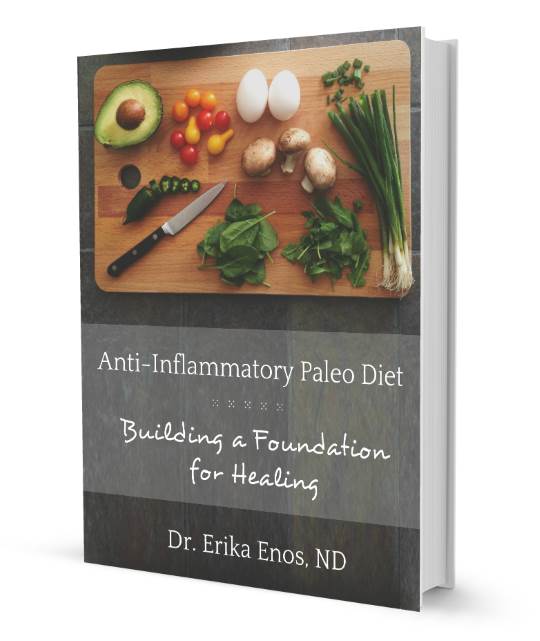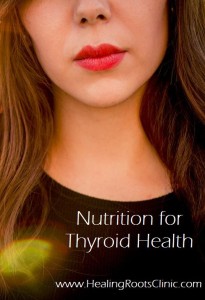 I hope you’ve been learning a lot of new information about the importance of the thyroid and thyroid health through this series of blogs. We’ve gone over the basics, talked about optimal blood tests to determine the health of the thyroid gland, discussed when medication is necessary long-term versus short-term, how non-autoimmune hypothyroidism differs from autoimmune hypothyroidism (Hashimoto’s), and Graves’ disease. I think this is a great time to talk about practical ways to support your thyroid through nutrition, and when necessary, supplementation.
I hope you’ve been learning a lot of new information about the importance of the thyroid and thyroid health through this series of blogs. We’ve gone over the basics, talked about optimal blood tests to determine the health of the thyroid gland, discussed when medication is necessary long-term versus short-term, how non-autoimmune hypothyroidism differs from autoimmune hypothyroidism (Hashimoto’s), and Graves’ disease. I think this is a great time to talk about practical ways to support your thyroid through nutrition, and when necessary, supplementation.
As for the disclaimer about the following advice, all of the recommendations for food sources below are safe for those with non-autoimmune hypothyroidism. For those with autoimmune thyroid disease (Hashimoto’s and Graves’), these recommendations should be used with caution and under the supervision of a health care provider. As always, I believe it is good sense that food sources be used before adding in supplements. And if you feel that supplementing is the next best step for you, it’s best to have adequate testing done because taking too much may become an issue.
The nutritional information below is for supporting the thyroid for optimal health. I’ll be talking about iodine, iron, selenium, zinc, essential fatty acids, and antioxidant-rich vegetables and fruits. I’ll discuss how these nutrients support the thyroid, common foods the nutrients are found in, and how supplementing may be appropriate. At the end we’ll also take a quick look at how supporting the adrenals nutritionally will help the thyroid as well.
Iodine
Iodine is perhaps one of the first nutrients people think of when they think of thyroid health. Iodine is one of the main components of thyroid hormones along with the amino acid tyrosine. The 4 and 3 we use to name thyroid hormones refer to the number of iodine molecules attached to tyrosine. T4 (thyroxine) has 4 iodine molecules and T3 (triiodothyronine) has 3.
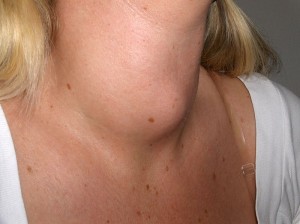
Goiter in Neck Image Source: Creative Commons
When a person is severely iodine deficient, they will develop a goiter. When a goiter is present, the neck looks swollen because the thyroid gland enlarges in order to get enough iodine to maintain normal production of thyroid hormone. Goiters are rare in developed countries due to iodized salt but some experts suggest that marginally- or slightly-deficient iodine levels are becoming more common in the US again (1).
As much as iodine is necessary for thyroid hormones to be produced, an excess will decrease the function of the TPO enzyme, called thyroid peroxidase, (2) and may actually encourage the development of or worsen autoimmune thyroid conditions like Hashimoto’s and Graves’. However, there is evidence suggesting that these issues only occur when selenium is deficient (3, 4). As an antioxidant, selenium protects thyroid tissue from damage caused by excess iodine.
Iodine Found in Food
 If you have low or normal thyroid function, but not Hashimoto’s, adding dietary sources of iodine and selenium is a safe option. Sea vegetables like nori, wakame, and arame are good options. In addition to increased dietary intake of iodine, it is a good idea to remove sources of chlorine (bathing and drinking water), fluoride (drinking water), and bromide (flours and anything made from white flour) from your diet and environment as these can compete with iodine in your body.
If you have low or normal thyroid function, but not Hashimoto’s, adding dietary sources of iodine and selenium is a safe option. Sea vegetables like nori, wakame, and arame are good options. In addition to increased dietary intake of iodine, it is a good idea to remove sources of chlorine (bathing and drinking water), fluoride (drinking water), and bromide (flours and anything made from white flour) from your diet and environment as these can compete with iodine in your body.
Iodine Supplementation
This nutrient in particular, along with iron, should only be supplemented after your levels have been assessed and it has been confirmed that you are hypothyroid but not autoimmune hypothyroid (Hashimoto’s). I recommend having a professional guide you through iodine supplementation if you are indeed deficient.
Iron
Adequate iron is needed to keep the thyroid healthy and when in recovery from thyroid disease. Thyroid peroxidase (TPO) is an enzyme found in thyroid tissue and needed for the production of the thyroid hormones, T3 and T4. TPO is a heme-dependent enzyme: this means it needs iron in order to function (5). Lack of iron can cause a decrease of 30 -50% (6) in TPO function which results in much less hormone production. In many types of thyroid disease, there has been damage to the thyroid and other endocrine tissues. Because oxygen is essential to tissue regeneration, iron is needed to carry oxygen throughout the body to the tissues in need of repair.
Iron Found in Food
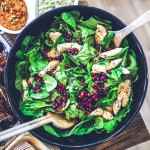 Red meats, liver, oysters, clams, and mussels are all great dietary sources of iron. Vegetarian sources include spinach, chard, pumpkin seeds, and many legumes including lentils and chickpeas. However, vegetarian sources of iron are not absorbed nearly as well as those from animal products. Pairing iron-rich foods with foods rich in Vitamin C in their raw form will increase absorption of the iron and protect the body from oxidation from the iron. Two examples of this pairing are steak with fresh pepper salsa and spinach salad with slices of strawberries or oranges. Avoid drinking coffee and tea with iron-rich foods as the tannins found in these will block the absorption of iron.
Red meats, liver, oysters, clams, and mussels are all great dietary sources of iron. Vegetarian sources include spinach, chard, pumpkin seeds, and many legumes including lentils and chickpeas. However, vegetarian sources of iron are not absorbed nearly as well as those from animal products. Pairing iron-rich foods with foods rich in Vitamin C in their raw form will increase absorption of the iron and protect the body from oxidation from the iron. Two examples of this pairing are steak with fresh pepper salsa and spinach salad with slices of strawberries or oranges. Avoid drinking coffee and tea with iron-rich foods as the tannins found in these will block the absorption of iron.
Iron Supplementation
Not everyone should be supplementing with iron. This nutrient has a sweet spot. Too much iron can cause oxidative damage and excess iron can be deposited in tissues including the pituitary gland. This causes damage to the pituitary and makes it unable to communicate effectively with the thyroid. Iron should be tested with a full iron panel before supplementing: this includes serum iron, ferritin, TIBC (total iron-binding capacity), and percent saturation, not just hemoglobin or iron levels.
Selenium
The tissue making up the thyroid gland contains high concentrations of selenium and many of the enzymes found there require selenium to function: this includes the enzymes used to make TPO and glutathione peroxidase, a major detoxifying enzyme (7). Glutathione peroxidase protects cells from oxidative damage which can contribute to reduced thyroid function and is also a characteristic component of autoimmune thyroid issues. Selenium is also an important part of the enzyme that converts T4 into T3. Remember that the thyroid produces mainly T4 which needs to be converted into T3 outside of the thyroid in order for the cells to actually be able to utilize it.
Selenium Found in Food
 Selenium is abundant in sea foods. Two Brazil nuts each day will give you 55 mcg/day which is the Recommended Daily Allowance (RDA) for selenium. However, those with thyroid issues will want to consume closer to 200 mcg/day.
Selenium is abundant in sea foods. Two Brazil nuts each day will give you 55 mcg/day which is the Recommended Daily Allowance (RDA) for selenium. However, those with thyroid issues will want to consume closer to 200 mcg/day.
Selenium Supplementation
There is conflicting evidence about whether or not supplementing with selenium will impact actual ratios of T3 to T4 (8, 9). Supplementation should be limited to 200 mcg per day in most cases. Levels of T3 and T4 along with symptoms should be monitored to make sure the desired effect is being achieved. Selenium, in the form of selenocysteine, has been shown to improve autoimmune thyroiditis (10).
Zinc
An essential nutrient for the synthesis of thyroid hormones, zinc levels are too often sub-optimal in many of my patients. This isn’t surprising given that oysters are the top source of dietary zinc. Lamb and beef are second and third containing around 30% of the RDA per serving. Foods rich in zinc are not typically part of the standard American diet. To make matters worse, a heavy intake of refined and un-sprouted grains depletes the body of zinc and other minerals. I use an in-office worksheet called a Zinc Tally Test along with a patient’s symptoms and physical exam to screen for zinc deficiency.
There is a vicious cycle of zinc depletion for hypothyroid patients. Zinc is needed to make thyroid hormones and thyroid hormones are needed for proper absorption of zinc (11). As the body’s zinc levels diminish, thyroid hormone production decreases and make it harder to absorb more zinc.
Zinc Found in Food
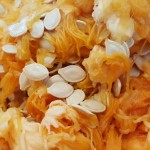 In addition to oysters and red meat, sesame seeds, pumpkin seeds, lentils, and garbanzo beans can all be good sources of zinc. However, just like improperly prepared grains can reduce zinc absorption and deplete the body’s existing stores, so can un-sprouted seeds, nuts, and legumes.
In addition to oysters and red meat, sesame seeds, pumpkin seeds, lentils, and garbanzo beans can all be good sources of zinc. However, just like improperly prepared grains can reduce zinc absorption and deplete the body’s existing stores, so can un-sprouted seeds, nuts, and legumes.
Zinc Supplementation
Even when I determine zinc deficiency to be severe, I recommend no more than 30 mg of zinc per day and more often a lower dose of 15 mg. Too much can deplete the body of copper and this causes issues.
Essential Fatty Acids (EFAs)
EFAs help reduce inflammation in the body and improve immunity. Inflammation is a prime player in the destruction of thyroid tissue and in the development of autoimmune diseases.
EFAs Found in Food
 While ground flax and chia seeds contain some Omega 3s, they are more difficult for the body to utilize and shouldn’t be relied on as your only source. Fish, wild salmon, and sardines, in particular, are great sources of Omega 3s. Grass-fed beef and eggs from grass-fed chickens contain more Omega 3s than those that are raised conventionally on feed made from corn and soy.
While ground flax and chia seeds contain some Omega 3s, they are more difficult for the body to utilize and shouldn’t be relied on as your only source. Fish, wild salmon, and sardines, in particular, are great sources of Omega 3s. Grass-fed beef and eggs from grass-fed chickens contain more Omega 3s than those that are raised conventionally on feed made from corn and soy.
EFAs Supplementation
A good quality cod liver oil, such as Carlson’s, is the best source for Omega-3 fatty acids. Omega-3s are the most deficient and most-needed EFAs for most people.
Antioxidant-Rich Vegetables and Fruits
 People with both hyperthyroid and hypothyroid issues have been shown to have greater oxidative stress occurring in their bodies than healthy people without thyroid disease (12). Therefore, enjoy a variety of richly colored fruits and vegetables every day. Typically, those with more color, especially more purples and reds, will be higher in antioxidants. Berries are the best choice for antioxidant-rich fruits. Aim for 7-10 servings of vegetables and 1-3 servings of fruit.
People with both hyperthyroid and hypothyroid issues have been shown to have greater oxidative stress occurring in their bodies than healthy people without thyroid disease (12). Therefore, enjoy a variety of richly colored fruits and vegetables every day. Typically, those with more color, especially more purples and reds, will be higher in antioxidants. Berries are the best choice for antioxidant-rich fruits. Aim for 7-10 servings of vegetables and 1-3 servings of fruit.
Feed Your Adrenal Glands
This really deserves a blog all on its own, but here is the cheat-sheet version.
- Eat healthy fats and protein with every meal and most snacks. Bone broth is an excellent source of protein that you can either make on your own (I think Chris Kresser does an excellent job of explaining how), or get some from Kettle & Fire.
- Eat lots of foods that are rich in Vitamin C: strawberries, papaya, citrus fruits, and bell peppers. The adrenal glands have a very high concentration of vitamin C.
- Adrenal glands also love rhythm and stable blood sugar levels. You can help create this for them by eating at regular mealtimes every day.

In addition to this, avoid the white processed stuff (flour and sugar) and too much caffeine. How much is too much caffeine? If you get jittery from caffeine, if you aren’t sleeping well, or if you crash in the afternoons, then you should keep caffeine intake very minimal. If you seem to tolerate it well, limit coffee and black tea to one sensibly sized cup in the mornings.
What to Avoid
The foods to avoid for good thyroid health are simply the foods you should avoid for good overall health. I’ll highlight a few that aren’t listed above under the adrenal gland recommendations.
- Processed foods should be largely avoided for good thyroid health. This includes foods like bread, pasta, cereals, frozen meals, and snack bars. These are, for the most part, lacking in nutrients and will even deplete the body of minerals and vitamins, including those listed above.
- Trans fats and hydrogenated- and partially-hydrogenated oils should be
 completely avoided. These cause inflammation in the body and mess up communication between cells. Nowadays, most people are savvy about avoiding trans fats as well as hydrogenated- and partially-hydrogenated oils found mainly in packaged foods and in some restaurant foods. (Remember how upset the restaurants in New York City were, especially the doughnut shops when hydrogenated oils and trans fats were banned in 2007?)
completely avoided. These cause inflammation in the body and mess up communication between cells. Nowadays, most people are savvy about avoiding trans fats as well as hydrogenated- and partially-hydrogenated oils found mainly in packaged foods and in some restaurant foods. (Remember how upset the restaurants in New York City were, especially the doughnut shops when hydrogenated oils and trans fats were banned in 2007?) - Rancid oils are also a must for avoiding. What oils are rancid? Think of a typical aisle at the supermarket that shelves the countless clear plastic bottles of vegetable, canola, soybean, cottonseed, safflower, and other cooking oils. These are all old and stale. If the chemical-laden and high-heat processing that is required to produce these oils didn’t already cause them to become rancid, the exposure to light while sitting on the supermarket shelves would… not to mention the chemicals in the cheap plastic they are stored in!
- Foods stored in plastic are best minimized to protect your thyroid and overall health. I know that this can sound tough but if you concentrate on whole foods like meats, veggies, fruits, and legumes (choose to buy in bulk if possible to avoid the plastic packaging), then it becomes much easier.
If you have an existing thyroid issue or would like to protect yourself from developing one, start here with the food-based recommendations. If you think you might need additional supplementation of some of the nutrients listed above, be sure to consult a professional to help you decide which ones and how much, particularly in regards to iron and iodine. Keep in mind that there is a myriad of reasons that thyroid diseases develop beyond diet. Explore these if food changes alone don’t do the trick.
Catch up on the rest of this blog series…
- The Thyroid Part 1 – The Basics
- The Thyroid Part 2 – Five Reasons Why Testing Only TSH Isn’t Enough
- The Thyroid Part 3 – Why Over-Medicating Thyroid Disease Masks the Underlying Problem
- The Thyroid Part 4 – Non-Autoimmune Hypothyroidism: When the Thyroid is Actually the Cause of Symptoms of Thyroid Disease
- The Thyroid Part 5 – Hashimoto’s: It’s More Than Just Your Thyroid
- The Thyroid Part 6 – Graves’ Disease: My 3 Recommendations
